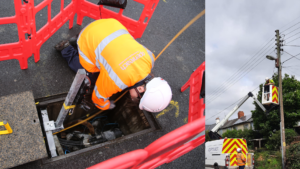Breakthrough on Openreach’s approach to restricted capabilities in Service Delivery
Telecoms & Financial Services, Openreach March 10 2023
Years of CWU campaigning for a fair and consistent approach on restricted capabilities has paid off in Openreach Service Delivery UK Operations (SD UK Ops) with the agreement of a comprehensive new process aimed at keeping those with temporary or permanent restrictions in fulfilling and valued employment.
Crucially, the new Restricted Capabilities Support Process – which was announced by the union yesterday (Thursday) – focuses on what engineers with restrictions can do rather that what they can’t.
As such, it holds out genuine promise of addressing longstanding CWU concerns that the potential contribution of loyal employees who, for whatever reason, find themselves unable to conduct the full range of duties, has sometimes been cruelly overlooked – with some even being effectively forced out the company.
Following on from a face-to-face commitment given by Openreach CEO Clive Selley in December 2021 that “there is work for everyone in Openreach” in response to just such complaints being forcefully raised by branches, yesterday’s unveiling of the new process is the culmination of months of detailed negotiations that were led, on the union’s side, by TFS Executive member Andy Mercer and the CWU Openreach National Team.
“Clive Selley certainly set the tone for the agreement we’ve now reached at that electric Openreach Briefing Committee back in December 2021,” stresses Andy. “However, it has not come about without the CWU really pushing the narrative and reminding individuals within the company of the commitment that Clive had given.
“The challenge now will be ensuring that this new process is consistently applied and delivers everything it promises, because ultimately the acid test of any national level agreement – however good it looks on paper – is whether tier-upon-tier of management stick to it.
“In principle, however, this new Restricted Capabilities Support Process has the potential to be a game-changer. Not only does it set a clear framework and perimeters around how managers should respond when restricted capabilities are identified – but, crucially, one of the overarching principles that we managed to get the company to agree is that that the CWU will be involved at the earliest possible stage.
“That’s really important – not just to ensure that the process is followed to the letter – but also because CWU reps often have better visibility of the full range of work that is carried out in a particular geographical area than individual managers. That means they may be able to identify options that may be available for people with restricted capabilities that would otherwise be missed.”
‘Can do’ approach promised…
Full details of the new process are set out in CWU LTB 060/23 . In summary, however, it requires managers to follow a clearly defined pathway that involves positively identifying what duties an individual with restrictions can conduct – then to proactively seek the ways in which those capabilities can be usefully used either within the individual’s current role, with reasonable adjustments, or to identify alternatives.
Crucially, only once such local efforts have been demonstrably exhausted will individuals with restricted capabilities be placed in a national ‘resource pool’. At that point a national team will first drill down to see if any possible solutions have been missed by the manager – after which their focus will switch to the availability of local desk-based work.
If that too draws a blank, the investigation will then extend to whether the individual with restricted capabilities can be supported by work being brought back from third party contractors or the displacement of agency resource.
Acting CWU National Officer for Openreach, Fiona Curtis, told CWU News: “Given the persistent feedback we’ve been receiving from some branches about even quite senior managers taking a less than sympathetic approach to individuals with restricted capabilities in certain parts of the country, this agreement is certainly timely and arguably long overdue.
“If adhered to properly across the whole of SD UK Ops it certainly has the potential to address those problem areas and provide a far more reliably humane response to members who are unfortunate enough to suffer temporary or permanent restrictions.
“Ultimately, however, the proof will be in the pudding…that’s why it’s so important we’ve secured Openreach’s commitment to regular joint reviews of how the new process beds in.
“Suffice to say, the CWU will be monitoring this closely – and I’d urge both branches and individuals to flag up any issues they encounter at the earliest possible opportunity.”
Commenting on the agreement, CWU deputy general secretary Andy Kerr concludes: “Fiona and her team have done an excellent job in negotiating this national agreement, which formalises a uniform set of procedures right across SD UK Ops and will bring peace of mind and a sense of security to many of our member who still have a great deal to contribute, but who cannot carry out some of the aspects of the engineer’s job.
“It’s great to see the union and Openreach working together productively and in a spirit of mutual interest once again. Agreements like this one prove in practice the benefit of a strong and well-organised trade union and the excellent work of our representatives.”

